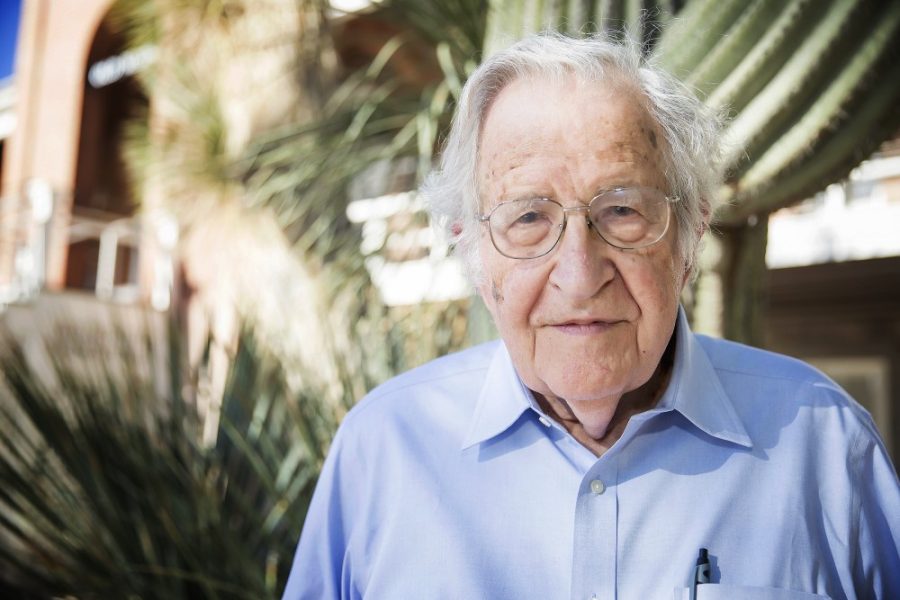The University of Arizona and the College of Social and Behavioral Sciences hosted “The Haury Conversation on Campus Free Speech” Wednesday, discussing important issues regarding open expression that are especially salient on universities throughout the country today.
Located in the Student Union Memorial Center, the event invited prominent free-speech advocates such as Noam Chomsky, UA laureate professor of linguistics, Sigal Ben-Porath, author of “Free Speech on Campus” and Nadine Strossen, lawyer and former president of the American Civil Liberties Union. First Amendment attorney Bob Corn-Revere moderated the panel.
According to Trevor Timm, the co-founder and executive director of the Freedom of the Press Foundation, young people and college students are more passionate than any other generation regarding civil rights issues. At the same time, however, the majority of college students do not fully support the right to free speech.
“We need to understand the point of view of many students who may be wary of first amendment law, and why students may not fully buy into the right to allow abhorrent speech, [which] actually protects them rather than hurts them,” Timm said.
Chomsky began the panel discussion by reiterating this point, explaining that free speech, for all groups and ideas, is in place to protect disparaged groups.
“The indication that there is a problem with free speech on campus is given by polls of students, which show that considerable majority believe that hateful ideas have no place on campus,” Chomsky said. “I think that is a problem. The motives are understandable, admirable in many days, and can be accommodated appropriately I think. Nevertheless, the principle is mistaken and it’s also a tactical error.”
The panelists argued that the same government justifications used to shut down white nationalist rallies are the same justifications conservative governments have used to shut down Black Lives Matter protests today.
“If you look at the history of such concepts, which is rich and ugly, such principles have almost invariably been directed against vulnerable groups,” Chomsky said.
So, while students may have good intentions in denouncing hate speech and wanting to prohibit it, the panelists agreed that restricting speech in any form can ultimately backfire on the groups that it’s supposed to protect the most.
“You have to look beyond the particular message to the underlying principle and you have to make people understand that if a hated message within a particular community can be stifled just because it is hated, then no speech is safe,” Strossen said.
Chompsky went on to explain that while hate speech is ultimately protected by the first amendment, to the disappointment of many, it’s important to confront the issue at its root rather than simply cover it up.
“If you have a festering sore, the cure is not to irritate it, but to find out what its roots are, where it comes from and to deal with that,” he said. “Racist and other such speech is a festering sore. By silencing it, you simply amplify its appeal and even lend it a veneer of respectability.”
The panelists also discussed the potential issues of “safe spaces” and a university’s responsibility to balance the creation of an inclusive environment, while also preserving the First Amendment rights of all students. Ben-Porath discussed this issue, explaining that while free speech should not be violated, the university should strive to counter balance certain views that do not fall in the line with their mission.
“I think universities must not censor or limit student organizations and student groups … but I would also say that the university should at the same time take the initiative to expand some of the ideas that are present on campus if it sees that these ideas are skewed or that some members of campus are not being effectively heard,” Ben-Porath said.
Ben-Porath also discussed her concern that young high school students are coming from institutions that are limiting self-expression more than ever.
RELATED: National experts to discuss free speech on campus
“When these same young people come to campus, they have never practiced, they have never experienced an atmosphere of open expression at the institutions that they study at,” she said.
Strossen agreed with Ben-Porath, explaining that free speech principles are not taught anymore and that this is a special responsibility for universities across the country.
Overall, all three panelists emphasized the importance of open expression and continuing to have healthy debates and discussions around these issues.
“We have to create opportunities for students to actually exercise their own free speech,” Strossen said. “We have to do it by encouraging you, in whatever your views are, to remember what I consider to be the most important right of all, and that is the right not to remain silent.”
Follow Jasmine Demers on Twitter









